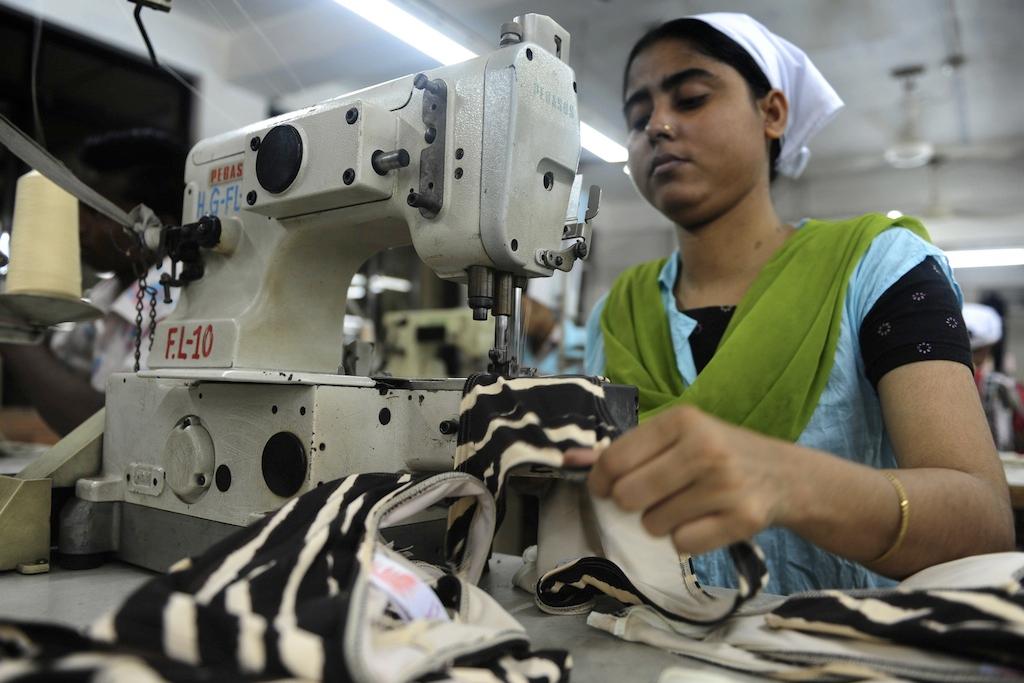Bangladesh government navigates increased scrutiny on labor rights
The textiles and clothing industry is Bangladesh’s biggest export earner, and the government has come under international pressure to deal with the lack of workers rights in the factories there.
As Bangladesh's star rises as a global manufacturing epicenter, the country's government is facing pressure to curb its use of paramilitary forces to suppress labor protesters and take a stronger stance on enforcing the rule of law inside its many profitable factories.
Bangladesh is home to thousands of such factories, many of which have been accused of illegal labor practices. The government, eager to maintain an economy of cheap labor, has gone to extremes to maintain order including using the military and police to forcefully dismantle protests and allegedly assassinating labor leaders like Aminul Islam, an influential voice against abuse and unfair work environments.
The Institute for Global Labor and Human Rights (IGLHR), an American non-profit advocacy organization, alleges that every factory worker in two of the largest textile factories in Bangladesh has experienced some type of abuse, ranging from forced, unpaid overtime to sexual harassment and beatings.
Workers in Bangladesh manufacture for labels such as Tommy Hilfiger and H&M but most barely make enough money each month to feed their families. Although IGLHR reports "significant improvements" since the US State Department and major American buyers began to express concern, most factories fall far short of international labor standards.
Many workers who have organized unions or protests have been fired and blacklisted, and in some cases even threatened with death.
The New York Times reported on one such person, Mohammad Helal Uddin, who was employed at the notorious Rosita factory and elected the leader of a 15-member worker council. After one woman complained of sexual harassment, workers at Rosita including Uddin went on strike, demanding a response to the woman's allegations, better treatment and higher pay.
More from GlobalPost: Working conditions in Bangladesh worry US importers
The factory was damaged in the protests that ensued and a crackdown by security officers commenced. Uddin was among those workers caught, fired and arrested. He was later taken by these same security forces, members of a special government squad called the Rapid Action Battalion, to the back of a car, and was held at gunpoint while he was forced to sign a resignation. He maintains his innocence.
"Inside the factories, according to several workers, police and paramilitary officers walked through the workrooms, holding termination letters. The message was clear: work or leave," reported the Times.
In and around the Bangladesh factories, this is the norm.
When Islam, a leader at the Bangladesh Center for Workers Solidarity, was found dead in April, his body bore signs of torture and eyewitnesses reported seeing a police van parked outside his office shortly before his death. Prime Minister Sheikh Hasina received a number of official requests for an official investigation, but there are no reports that the government did anything. In fact, some evidence suggested the government itself was behind Islam's murder.
The Hong-Kong based South Ocean Group owns many of the factories in question, including the Rosita factory and its sister, Megatex. They are situated in an "Export Zone," which operates autonomously with its own laws, often outside the rule of law of Bangladesh. The Times compared it to a "country within a country."
More from GlobalPost: HRW: Bangladesh should investigate missing activists
The Export Zones are the business of foreign investors who own the companies, and the Bangladeshi government tends to stay clear of any controversy inside, for fear of negative backlash from the foreign interests that have put Bangladesh on the map.
![]()
"Bangladesh’s rights problems are consistent and acute across successive governments and we believe that the situation in the country deserves regular and high-level attention from the US, the UN and others," said John Sifton, Asia advocacy director for Human Rights Watch in Congressional testimony. "Human Rights Watch welcomes the greater attention the United States gives to Bangladesh. Secretary of State Hillary Clinton made a key visit to Dhaka this year—the first by a US secretary of state since 2003. Notably, human rights concerns were strongly and publicly raised by Secretary Clinton during her visit."
More from GlobalPost: Bangladesh's garment workers brave deadly fires
But it's not only the responsibility of the US to clean up Bangladesh. The government there must also pull its weight, says IGLHR. Although there have been some improvements in the past weeks (such as a slight wage increase and overtime pay), South Ocean and the independent labor oversight firm Verité are only reporting half the truth. (See embedded image, left.)
"To the credit of South Ocean, Verité, the European and Australian labels and the workers themselves, the Rosita and Megatex factories have been brought largely into compliance with Bangladesh's labor laws. This is a huge step forward," said IGLHR.
Chart via Institute for Global Labor and Human Rights.
For more of GlobalPost's coverage of labor rights around the world, check out our Special Report "Worked Over: The Global Decline of Labor Rights."
We want to hear your feedback so we can keep improving our website, theworld.org. Please fill out this quick survey and let us know your thoughts (your answers will be anonymous). Thanks for your time!
